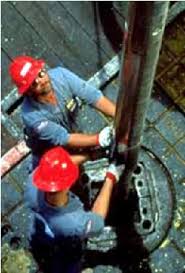Friday, March 13, 2009
 Oil Rich Nations Seek Majors Expertise
Oil Rich Nations Seek Majors Expertise
 03-12-2009 - The Financial Times by Sheila McNulty – Dave O'Reilly, chief executive of Chevron, said the oil-rich countries that erected barriers to international oil companies amid the run-up in commodity prices were now seeking their expertise in managing the drastic fall. "They're back now looking for [our] investment,' Mr. O'Reilly told Chevron's annual analysts' meeting. The high prices had led countries such as Venezuela and Russia to raise barriers to the international oil companies, which have gone from control of 85 per cent of the world's oil reserves in 1970 to less than 10 per cent now. With prices on the rise, these countries did not feel they had to be as careful with their resources; some began managing their own oil and gas and failed to reinvest adequate profits to maintain production. Indeed, in 2007, Venezuela nationalized the energy sector and expropriated the assets of ExxonMobil and ConocoPhillips, which disagreed with the new terms offered. But oil prices have dropped from $147 a barrel last year to $48 a barrel, and US natural gas prices have fallen from more than $13 per million British thermal units to below $4. The oil-rich nations now require the expertise of the international oil companies to get costs down and grow production to maintain their economies. "This is a time they need companies like ours more than ever,' Mr. O'Reilly said. "That threat [to further nationalize] has receded quite a bit.' Rex Tillerson, Exxon's chief executive, agreed, noting Exxon had been around for more than 100 years and had vast experience with the rise and fall in commodity prices. The jury was still out, he said, on how the Russians would handle it: "They did not see this coming; they are dealing with it in real time.' He said Exxon was still embroiled in arbitration negotiations with Venezuela over the expropriation of its assets there. However, he said the delays on the Sakhalin 1 project were not due to the crisis but rather to changes on the Russian side of the board regulating the project, which meant new people did not understand the project and, therefore, did not approve processes as quickly. Mr. O'Reilly said Chevron was in a strong position, never having been "caught up in $140 oil'. It had a long queue of future projects and did not need to find opportunities in the downturn, although it would keep its eyes open. "We have a tremendous suite of opportunities and are not dependent on these opportunities to grow our portfolios,' Mr. O'Reilly said. Chevron would focus on reducing the cost of doing business, which had grown inflated with the rise in prices. It recognized it must not press vendors too hard, however, so they were healthy enough to help Chevron when demand rebounded.
03-12-2009 - The Financial Times by Sheila McNulty – Dave O'Reilly, chief executive of Chevron, said the oil-rich countries that erected barriers to international oil companies amid the run-up in commodity prices were now seeking their expertise in managing the drastic fall. "They're back now looking for [our] investment,' Mr. O'Reilly told Chevron's annual analysts' meeting. The high prices had led countries such as Venezuela and Russia to raise barriers to the international oil companies, which have gone from control of 85 per cent of the world's oil reserves in 1970 to less than 10 per cent now. With prices on the rise, these countries did not feel they had to be as careful with their resources; some began managing their own oil and gas and failed to reinvest adequate profits to maintain production. Indeed, in 2007, Venezuela nationalized the energy sector and expropriated the assets of ExxonMobil and ConocoPhillips, which disagreed with the new terms offered. But oil prices have dropped from $147 a barrel last year to $48 a barrel, and US natural gas prices have fallen from more than $13 per million British thermal units to below $4. The oil-rich nations now require the expertise of the international oil companies to get costs down and grow production to maintain their economies. "This is a time they need companies like ours more than ever,' Mr. O'Reilly said. "That threat [to further nationalize] has receded quite a bit.' Rex Tillerson, Exxon's chief executive, agreed, noting Exxon had been around for more than 100 years and had vast experience with the rise and fall in commodity prices. The jury was still out, he said, on how the Russians would handle it: "They did not see this coming; they are dealing with it in real time.' He said Exxon was still embroiled in arbitration negotiations with Venezuela over the expropriation of its assets there. However, he said the delays on the Sakhalin 1 project were not due to the crisis but rather to changes on the Russian side of the board regulating the project, which meant new people did not understand the project and, therefore, did not approve processes as quickly. Mr. O'Reilly said Chevron was in a strong position, never having been "caught up in $140 oil'. It had a long queue of future projects and did not need to find opportunities in the downturn, although it would keep its eyes open. "We have a tremendous suite of opportunities and are not dependent on these opportunities to grow our portfolios,' Mr. O'Reilly said. Chevron would focus on reducing the cost of doing business, which had grown inflated with the rise in prices. It recognized it must not press vendors too hard, however, so they were healthy enough to help Chevron when demand rebounded. Contact me:


